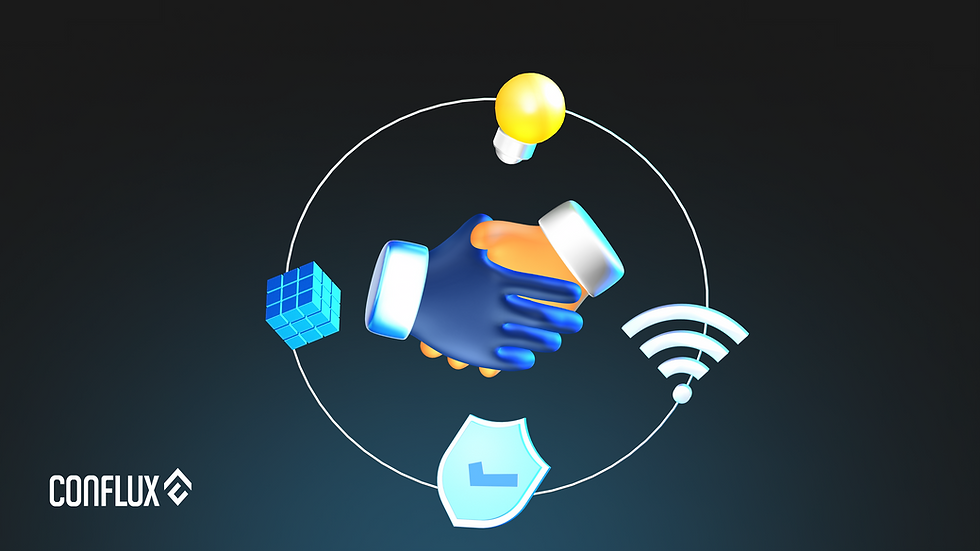The Perfect Partnership: Blockchain and IoT
- Conflux Network
- Jul 19, 2024
- 3 min read

The Internet of Things (IoT) is transforming how you live and work. From smart homes to industrial automation, IoT devices are everywhere. But with this comes significant security and management challenges. Enter blockchain technology—a promising solution to these issues. Let’s explore how integrating blockchain with IoT can be a perfect match, enhancing security, efficiency, and trust for you.
What is IoT?
The Internet of Things (IoT) refers to all the physical devices connected to the internet, collecting and sharing data. These devices range from home appliances and wearable tech to industrial machines and city infrastructure. IoT aims to create smart environments by enabling devices to communicate and work together seamlessly.
What is Blockchain?
Think of blockchain as a secure, decentralized digital ledger. It records transactions across many computers, making it very hard to tamper with the data. Once data is added, it cannot be changed or deleted, making it a reliable solution for your security needs.
The Benefits of Integrating Blockchain with IoT
Enhanced Security
● Data Integrity: Blockchain ensures that data from your IoT devices is tamper-proof. Each piece of data is recorded securely, making it extremely difficult for hackers to alter the information.
● Decentralization: Traditional IoT networks rely on central servers, which can be easy targets for hackers. Blockchain’s decentralized nature removes this single point of failure, increasing the overall security of your network.
● Authentication: Blockchain can provide a secure way to authenticate your IoT devices, ensuring that only authorized devices can join your network and communicate with each other.
Improved Efficiency
● Automated Processes: Smart contracts on the blockchain can automate IoT processes for you. For example, a smart contract can automatically trigger actions when certain conditions are met, such as reordering supplies when inventory levels are low.
● Real-Time Monitoring: Blockchain allows for real-time data recording and monitoring. This can be crucial in industries like manufacturing and logistics, where timely information is vital for decision-making.
Transparency and Trust● Immutable Records: Blockchain creates a transparent and permanent record of all transactions and data exchanges. This can be particularly useful in supply chain management, where you need to trust the authenticity and history of products.
● Traceability: With blockchain, every action taken by your IoT devices can be traced back to its origin. This level of traceability can help in identifying issues, ensuring compliance, and maintaining accountability.
Challenges of Integrating Blockchain with IoT
Scalability
● Volume of Data: IoT networks generate vast amounts of data. Blockchain networks can
struggle with handling this high volume of transactions efficiently. Solutions like off-chain storage and scalable blockchain technologies are being explored to address this issue.
Resource Constraints
● Power and Processing: Many IoT devices have limited power and processing
capabilities. Blockchain operations, especially those involving complex computations, can be resource-intensive. Lightweight blockchain solutions and optimizing your IoT device performance are necessary to overcome this challenge.
Interoperability
● Different Standards: IoT devices and blockchain platforms often operate on different standards and protocols. Ensuring seamless interoperability between various devices and blockchain networks requires developing common standards and protocols.
Cost
● Implementation Costs: Setting up and maintaining a blockchain network can be costly. While the long-term benefits may outweigh the initial investment, the upfront costs can be a barrier for many organizations.
Real-World Applications
Supply Chain Management
● You can use blockchain to enhance the traceability and transparency of your supply chains. By integrating IoT sensors with blockchain, you can track the journey of products from origin to consumer, ensuring authenticity and quality.
Smart Cities● Blockchain can secure the vast networks of IoT devices in smart cities, from traffic lights to energy grids. This integration can help manage resources efficiently, improve public services, and enhance the overall quality of urban life for you.
Healthcare
● In healthcare, blockchain can secure patient data collected by IoT devices like wearable health monitors. This ensures that sensitive information is protected while allowing doctors and patients to access accurate and up-to-date health records.
Agriculture
● Farmers can use IoT devices to monitor crop conditions and livestock health. By
recording this data on a blockchain, you can ensure its accuracy and traceability, leading to better decision-making and sustainable practices.
Integrating blockchain and IoT holds immense potential for you. By combining the security, transparency, and immutability of blockchain with the connectivity and data generation of IoT , you can create robust systems that are efficient, secure, and trustworthy. While there are challenges to overcome, the benefits far outweigh the obstacles. As technology advances, the synergy between blockchain and IoT will likely become a cornerstone of our digital future, driving innovation across various sectors and improving your everyday life.



Comments